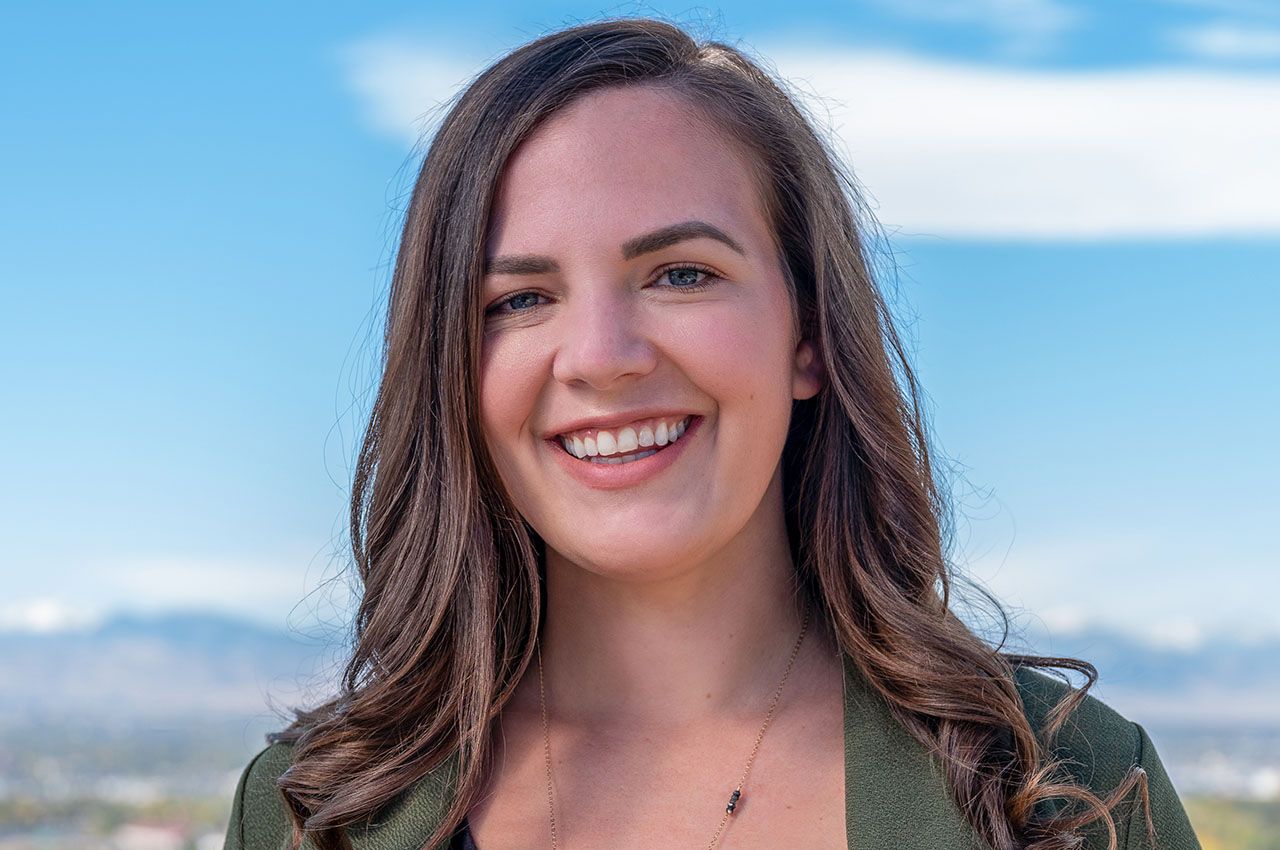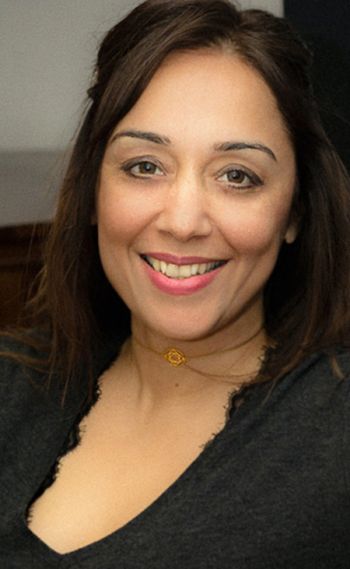Pro Bono at the Border

Samantha Wolfe’s first trip to Dilley, Texas, was a tear-filled eye-opener. She traveled to the South Texas Family Residential Center, about 60 miles from the Mexican border, to hear more “credible fear” than she could possibly prepare for.
That legal standard—needed for the United States Citizenship and Immigration Services to grant asylum—wasn’t hard to meet, she soon found. Roughly “98 to 99 percent” of the fear Wolfe ’13 heard from the women and children at the center, she says, was credible enough to allow them to stay.
It was also credible enough to be traumatizing to those, like Wolfe, who were told about it. Many of the families had fled gang violence—single mothers who were extorted or raped, or had their kids targeted, either for sexual assault or gang initiation.
“You have these ideas that you’re going to help people, and they tell you the worst things that happened in their life. The women didn’t care about themselves; they cared about their children,” says Wolfe, who did the work pro bono on her off-time from her corporate job. “The secondary trauma…it’s really hard, grueling work, helping these women.”
Still, when she talked to students at Chicago-Kent College of Law about the experience nearly a year later, they didn’t shy away.
Instead, about a dozen of them volunteered to spend their spring break at the center, doing what Wolfe did. The following year, even more volunteered to return, meeting with more than 200 clients per trip. Wolfe accompanied them both times pro bono, the only licensed attorney of the bunch, serving as a mixture of consultant, counselor, and therapist, whatever was needed.
“These stories keep me up at night, still,” says Melissa Ortega ’19, who went on both trips in 2018 and 2019, and also served as a translator. “I know with Sam, we cried every night. It was tough. She had no duty to go and she still went. Being an attorney, I know how busy she was, and how hard it was for her to get away.”
Adds Ortega, “I am a daughter of immigrants; my parents immigrated from Mexico. For a lot of us, our parents were immigrants but they didn’t go through what the [clients] did.
“So there was this feeling, that could’ve been us. It did hit close to home....What I took away is an immense appreciation for the life I have now.”
Becca Spira ’19, who along with Joanna Martin ’19 helped organize both trips as co-chairs of Chicago-Kent’s Immigration Law Society (ILS), notes that the college stepped up its support the second time around. After Tatiana Alonso ’20, who had attended the trip in 2018, spoke to Chicago-Kent’s Board of Advisors, each board member personally pledged $1,000 to fund a return in 2019.
“They immediately emailed, saying ‘You’ve got the money,’ ” Alonso says. It was enough to cover flights, food, and hotel stays for the nearly dozen students who went. Students went again in January 2020, right before COVID-19 halted future trips.
“I don’t think a single one of us really understood what level of second-hand trauma we were going to experience,” adds Alonso, whose parents also immigrated from Mexico. “I’m glad we did it, and I’d do it again in a heartbeat. It meant a lot to be able to give back.”
In November the ILS spoke and presented a documentary of its members’ experiences at a conference on student activism hosted by the Illinois Holocaust Museum. The school also created the Dilley Practicum after a push by Professor Felice Batlan, allowing the students to earn two credits for their efforts.
“We saw the extraordinary work that needed to be done, and the students were transformed by the experience,” Batlan says. “The class really explored the background of what was happening in the countries where people were coming from, and what was happening to the women in these countries. Students kept diaries and wrote position papers as a way to address the secondary trauma as well as a way to address the larger historical context.”
Wolfe’s day job is a little less harrowing—as an associate at Ogletree Deakins’ Denver office, she works with companies trying to shift their global workforce. “Global mobility,” it’s called.
Still, in recent months, the crisis management skills she honed in Dilley have helped her with that work as well. Wolfe has been tasked with trying to get clients’ families out of Afghanistan, specifically those working for U.S. companies that had operated under the old regime.
In the week after the U.S. withdrawal from the country in August 2021, Wolfe related how one of the client families has a two-month-old baby girl. Another includes four daughters. The parents—translators or point-persons for financial institutions—are fearful of their children being raised in a country run by the Taliban, which has been traditionally opposed to women receiving an education, among other numerous gender disparities.
“We’re hearing reports of people who go to the airport and see people shot right in front of them,” Wolfe said during the August evacuations. “It’s just absolute chaos. Even if we’re able to contact them…even sending that information, you could be sending someone out to their death. It’s a really high-stress situation right now.”
Both at home and from her office, which is decorated with keepsakes from trips she’s taken and people she’s met or helped, Wolfe tries at first to get people approved by the U.S. government, then to arrange for families to reach U.S. embassies in adjacent countries, since the one in Kabul, Afghanistan, closed. She communicates with them through back channels, gets them passwords for buses, and teaches them how to wipe their phones in case they run into a Taliban checkpoint, where their devices might be confiscated.
And as far as entering the U.S., from the Department of Homeland Security to the State Department, “It’s a process that involves collaboration with multiple government agencies. And it’s a very complicated process,” says Marissa Cwik, another attorney at Ogletree who works on the parole cases with Wolfe.
The cases were still pending at the time of this magazine’s publication.
“She’s in the thick of this stuff, working way above and beyond what would normally be expected. All weekend, she was texting with these folks and trying to do what she could,” says John Combs, a shareholder at the firm who works closely with Wolfe and has been an immigration attorney for 25 years. “She’s honestly one of my favorite people I’ve worked with in my entire career. She has an incredible passion for service.”
But Wolfe is quick to note she isn’t doing it alone.
“The awesome thing about immigration attorneys is that we really do collaborate with each other. There’s so much camaraderie,” Wolfe says.
Every week, Wolfe scours multiple listservs, including one specifically about Afghan evacuees. Over the initial weekend following the withdrawal of U.S. forces, she received 200 emails from that listserv alone.
“We’re just going blind. There are changes at the drop of a hat,” she said at the time. “But immigration law, since the day I started, has been at the forefront of all these crazy issues.”
Born and raised in Tinley Park, Illinois, Wolfe received a bachelor’s degree in Spanish from the University of Illinois at Urbana-Champaign and taught English in Spain for a year before coming to Chicago-Kent.
Upon graduation, she initially worked at a couple smaller Chicago immigration firms, Global Immigration Associates and R.C. Immigration, before changes to federal immigration policy under the Trump Administration motivated her to do pro bono work at Chicago’s O’Hare International Airport, trying to help Muslim immigrants halted there by a federal travel ban.
She expanded her volunteer efforts by taking her first trip on her own to Dilley in 2016. While there, another volunteer she befriended encouraged her to apply at Ogletree.
On top of the Afghanistan cases, adds Cwik, “Sam is really a leader in the pro-bono movement at Ogletree. She’s taken pro bono cases and made herself available as a resource.…Having a co-worker with that energy can really change for the better how people approach problems. When Sam talks to you, you really feel like she’s present in that conversation.”
When Wolfe finally talks about the typical responsibilities of her day job, though, she notes it’s nice to take a breather from cases where lives could be on the line.
“I always recommend this type of law if anybody will listen. It’s so rewarding; it’s not contentious or adversarial. You’re just fighting the government, which to me doesn’t seem contentious,” she says. “It keeps growing every single year, just the need and demand from companies. And we do get the opportunities to do the pro bono stuff in our free time. It’s a sweet spot, the pro-bono stuff can really impact you emotionally.”
“Still, people only want to hear about the pro bono stuff,” Wolfe laughs. And as far as another Dilley trip, she adds, “I’m absolutely open to doing it again.”


